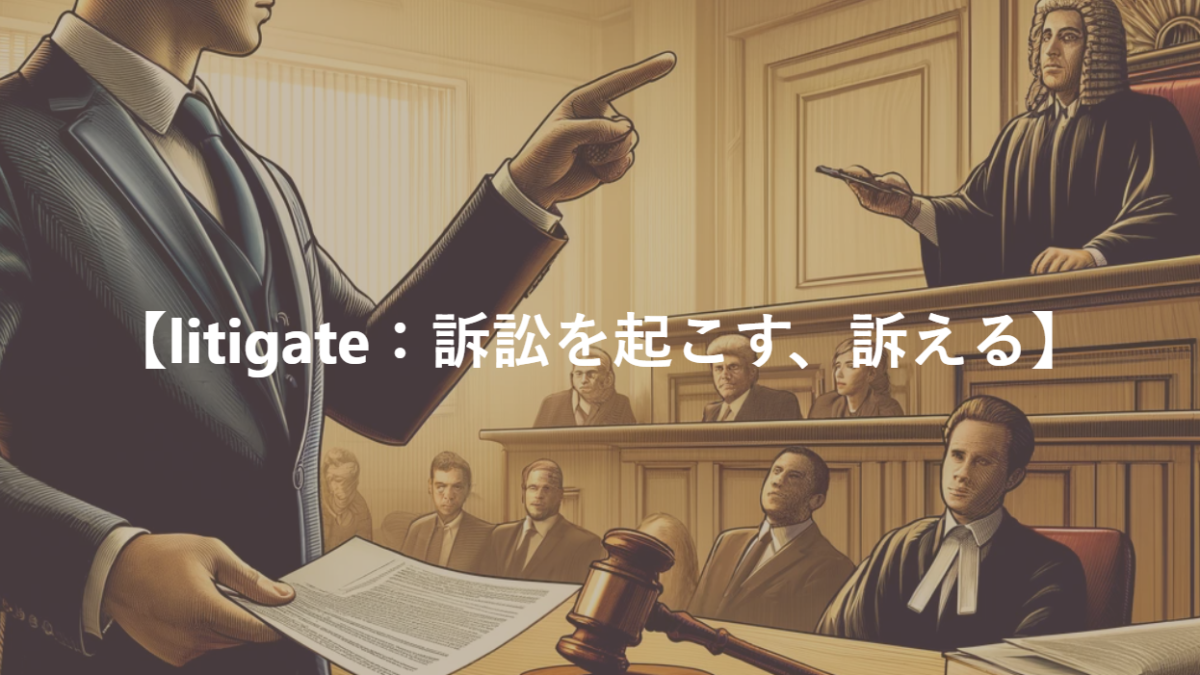語源・類義語・反対語・例文
【litigate(リティゲイト):訴訟を起こす、訴える】という単語の語源とか由来を知っていますか?
「Litigate」は、ラテン語の「litigare」から派生しています。これは「litig-」(争い)という語根から来ており、「to dispute」(争う)または「to sue」(訴える)という意味です。「litigare」自体は、「lis」(複数形は「lites」)という語根に由来しており、これは「争い」や「訴訟」を意味します。そのため、「litigate」の語源は、文字通りには「争う」や「訴訟を起こす」という行為を指すことになります。
時間が経つにつれて、「litigate」は主に法的な文脈で使われるようになり、裁判所での訴訟手続きや法的な争いを指す言葉として英語で定着しました。この単語は、個人や団体が自身の権利を主張したり、法的な紛争を解決するために裁判所に訴える行為を表現するのに使用されます。
“Litigate” derives from the Latin “litigare,” which originates from the root “litig-” (dispute), meaning “to dispute” or “to sue.” “Litigare” itself comes from the root “lis” (plural “lites”), which means “dispute” or “lawsuit.” Therefore, the etymology of “litigate” literally refers to the act of disputing or initiating a lawsuit.
Over time, “litigate” has come to be used primarily in a legal context, becoming established in English as a term denoting court proceedings or legal disputes. The word is used to describe the act of individuals or organizations asserting their rights or resolving legal conflicts through court action.
この単語の類義語・反対語を教えてください。
類義語
- Sue: 訴える。法的な手続きを通じて権利や賠償を求める行為。
- Prosecute: 起訴する。特に、犯罪の嫌疑で公的に訴える行為。
- Contest: 競争する、争う。特定の問題について法的に争う。
- File a lawsuit: 訴訟を提起する。裁判所に訴訟を正式に申し立てる行為。
- Take to court: 裁判所に持ち込む。法的紛争を解決するために裁判所に訴える。
反対語
- Settle: 解決する。裁判外で争いや訴訟を和解する行為。
- Withdraw a lawsuit: 訴訟を取り下げる。提出された訴訟を正式に撤回する。
- Resolve: 解決する。紛争や問題を和解や合意によって解決する。
- Conciliate: 和解させる。対立する当事者間で仲介し、紛争を解決する。
- Mediate: 仲介する。第三者が介入して紛争の当事者間の和解を促す。
似た単語で間違いやすい単語はありますか?
- Sue: 「Sue」は「litigate」と非常によく似ており、しばしば同義語として使われますが、「sue」は一般に個人が損害賠償や特定の法的救済を求めて法的行動を起こすことを指します。「Litigate」はより広い範囲の訴訟プロセス全般を指すことができます。
- Prosecute: 「Prosecute」は犯罪に関する訴訟を起こすことを指し、特に国家や公共の機関が犯罪者に対して法的手続きを行う場合に使用されます。「Litigate」とは異なり、通常は刑事訴訟に限定されます。
- Arbitrate: 「Arbitrate」(仲裁する)は、当事者間の紛争を解決するために第三者が判断を下すプロセスを指します。これは「litigate」と異なり、裁判所外での解決手段であり、より非公式かつ柔軟なアプローチを意味します。
- Mediate: 「Mediate」(調停する)も裁判所外での紛争解決方法を指しますが、ここでは調停者が当事者間で和解を促す役割を果たします。「Litigate」とは対照的に、調停はより協力的な解決を目指します。
- Adjudicate: 「Adjudicate」(裁定する)は、裁判官や裁判所が法的な争いや請求に対して最終的な決定を下すプロセスを指します。これは「litigate」のプロセスの一部と見なすことができますが、「adjudicate」は特に決定を下す行為に焦点を当てています。
この単語を使った例文をいくつか教えてください
We decided to litigate the matter in court.
(私たちは裁判でその問題を訴えることに決めました。)
The company was litigated for violating antitrust laws.
(その企業は独占禁止法に違反したとして訴えられた。)
He threatened to litigate if the settlement offer wasn’t increased.
(和解金が増えなければ訴訟を起こすと脅しました。)
The two parties were unable to reach a settlement and had to litigate the dispute.
(両当事者は和解に達せず、紛争を訴訟することになった。)
The lawyer explained to the client the risks involved in litigating the case.
(弁護士はクライアントに、訴訟にかかるリスクについて説明した。)
【litigate:訴訟を起こす、訴える】のコロケーション
- Litigate a case: 訴訟を起こす。裁判所で法的な争いを行うことを意味します。このフレーズは、特定の事件や問題に関する訴訟を行う状況を指します。
- Litigate a dispute: 紛争を訴える。争いや不一致を解決するために法的手続きを取ることを示します。この表現は、民事訴訟を通じて紛争を解決しようとする意志を反映しています。
- Litigate a claim: 請求を訴える。特定の権利や要求に基づいて訴訟を起こす行為を指します。これは、損害賠償や契約違反など、法的な請求を裁判所で主張する場合に使用されます。
- Litigate an issue: 問題を訴える。特定の法的問題や議論の点を裁判で争うことを意味します。このフレーズは、法的な議論や解釈の問題が裁判の焦点となる場合に適用されます。
- Threaten to litigate: 訴訟をちらつかせる。法的措置を取ることを示唆または警告する行為を指します。この表現は、通常、交渉や議論の文脈で、相手に対して訴訟を起こす可能性があることを伝える際に使用されます。
法律用語の複雑な世界では、「litigate」が使用される様々な文脈を理解することが、明確なコミュニケーションに不可欠です。「litigate」という言葉は、いくつかのコロケーションと関連しており、それぞれが法的枠組み内で一般的に遭遇する異なるシナリオを示しています。
まず、「Litigate a case」は、法廷内での法的な戦いに取り組む行為を指します。このフレーズは、法的な争いや特定の事項が正式な法的手続きを通じて解決を要する状況に具体的に適用されます。
次に、「Litigate a dispute」は、法的手段を通じて不一致や紛争を解決するプロセスを示します。この表現は、他の形態の紛争解決とは対照的に、民事訴訟を通じた紛争の法的解決への移行を強調しています。
さらに、「Litigate a claim」は、特定の権利や要求に基づいて訴訟を提起する行為に関連しています。これは通常、個人や団体が法廷で自分たちの請求を主張する場合に使用されます。例えば、個人傷害に対する損害賠償を求めるか、契約違反を取り扱うなどです。
さらに、「Litigate an issue」は、特定の法的問題や議論の点を裁判で争う行為を示します。このフレーズは、裁判の焦点が特定の法的議論や解釈に関する場合に適用されます。
最後に、「Threaten to litigate」は、潜在的な法的措置を示唆または警告することを意味します。通常、交渉や議論の文脈で使用され、満足のいく合意に達しない場合に訴訟を起こす可能性を伝える際に使用されます。
これらのコロケーションを通じて、「litigate」は法的論議内で多用途に使用される用語として現れ、一般に法的手続きや訴訟の文脈で使われます。それぞれのインスタンスは、個人や団体が自分たちの法的問題や紛争を裁判所に持ち込む過程をどのように進めるかについての具体的な例を提供します。
In the intricate world of legal terminology, understanding the various contexts in which the term “litigate” is used proves essential for clear communication. The word “litigate” associates with several collocations, each illustrating different scenarios typically encountered within the legal framework.
Firstly, “Litigate a case” refers to the act of engaging in a legal battle within a courtroom setting. This phrase specifically applies to situations where there is a legal dispute or a particular matter that requires resolution through formal legal proceedings.
Next, “Litigate a dispute” denotes the process of resolving disagreements or conflicts through legal means. This expression reflects the intent to settle disputes through civil litigation, emphasizing the move towards legal resolution as opposed to other forms of conflict resolution.
Moreover, “Litigate a claim” pertains to the action of bringing forth a lawsuit based on specific rights or demands. This is commonly used when individuals or entities assert their claims in court, such as seeking damages for personal injury or addressing breaches of contract.
Additionally, “Litigate an issue” indicates the action of contesting a particular legal issue or point of debate in court. This phrase is applicable when the focus of a trial revolves around a specific legal argument or interpretation.
Lastly, “Threaten to litigate” involves indicating or warning of potential legal action. Typically employed within the context of negotiations or discussions, this expression is used to communicate the possibility of initiating a lawsuit if a satisfactory agreement cannot be reached.
Through these collocations, “litigate” emerges as a versatile term within legal discourse, commonly used in the context of legal proceedings and litigation. Each instance provides a concrete example of how individuals or organizations proceed with the process of bringing their legal issues or disputes before a court.
英語学習用問題
語彙問題
1.次の文章の空欄に入る最も適切な単語を選びなさい。
The company was _ for violating antitrust laws.
(A) settled
(B) litigated
(C) mediated
(D) conciliated
解答と解説
正解: (B) litigated
解説: 文脈上、「独占禁止法に違反したとして訴えられた」という意味を持つため、”litigated”が最も適切です。
2.次の単語の中で、「litigate」と類義語でないものを選びなさい。
(A) Sue
(B) Prosecute
(C) Contest
(D) Settle
解答と解説
正解: (D) Settle
解説: “Settle”(解決する)は反対語であり、他の3つは「訴訟を起こす」または「争う」という意味の類義語です。
文法問題
- 次の文章を正しく完成させるために、適切な語を選びなさい。
They were unable to reach an agreement and had to _ the dispute.
(A) litigate
(B) settle
(C) mediate
(D) withdraw
解答と解説
正解: (A) litigate
解説: 文脈上、「合意に達することができず、訴訟することになった」という意味を持つため、”litigate”が最も適切です。
語源問題
- 「litigate」という単語の語源について正しい説明を選びなさい。
(A) ラテン語の”litigare”から派生し、「争い」や「訴訟」を意味する。
(B) 古フランス語の”litigier”から派生し、「法律」を意味する。
(C) ギリシャ語の”litikos”から派生し、「訴訟」を意味する。
(D) 古英語の”litigan”から派生し、「裁判」を意味する。
解答と解説
正解: (A) ラテン語の”litigare”から派生し、「争い」や「訴訟」を意味する。
解説: “litigate”の語源はラテン語の”litigare”であり、「争い」や「訴訟」を意味します。
類義語と反対語
- 次の単語の中で、「litigate」の反対語として最も適切なものを選びなさい。
(A) Prosecute
(B) Resolve
(C) Contest
(D) Sue
解答と解説
正解: (B) Resolve
解説: “Resolve”(解決する)は「訴訟を起こす」の反対語であり、他の3つは類義語です。
使用例文
- 次の文章において、「litigate」と同じ意味で使われる語句を選びなさい。
We decided to _ the matter in court.
(A) settle
(B) withdraw
(C) litigate
(D) mediate
解答と解説
正解: (C) litigate
解説: 文脈上、「裁判でその問題を訴えることに決めました」という意味を持つため、”litigate”が最も適切です。

